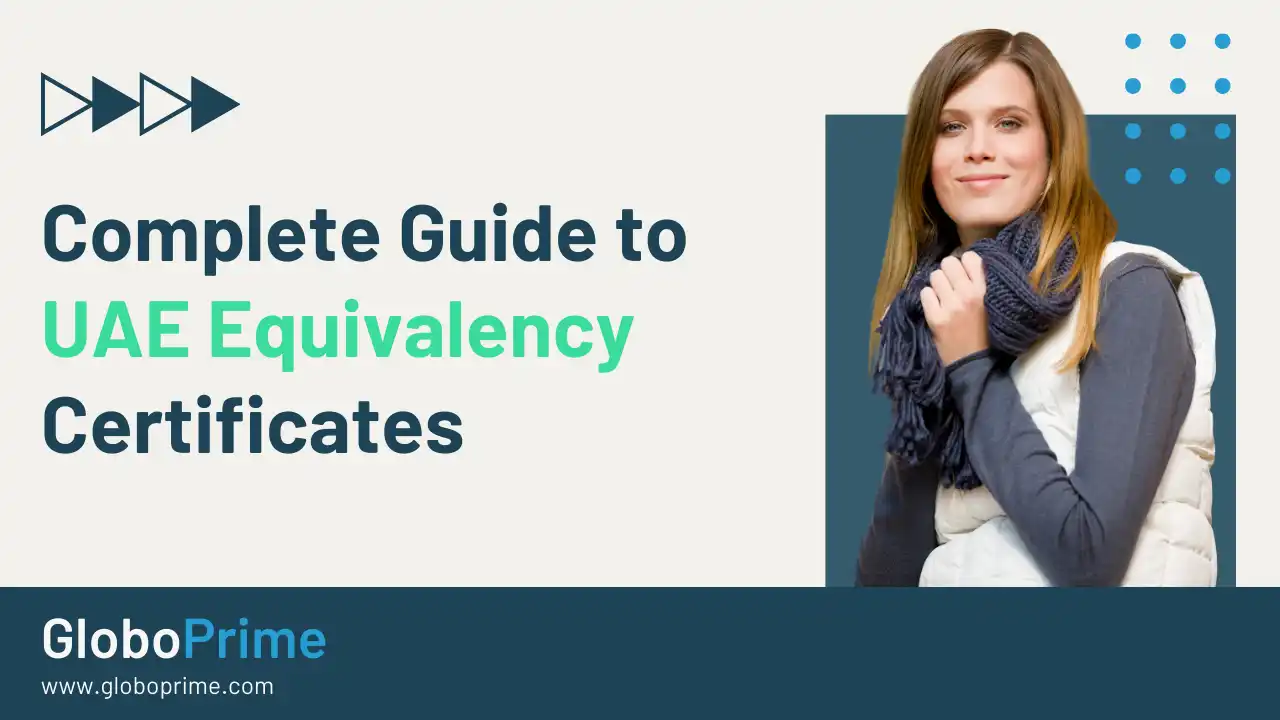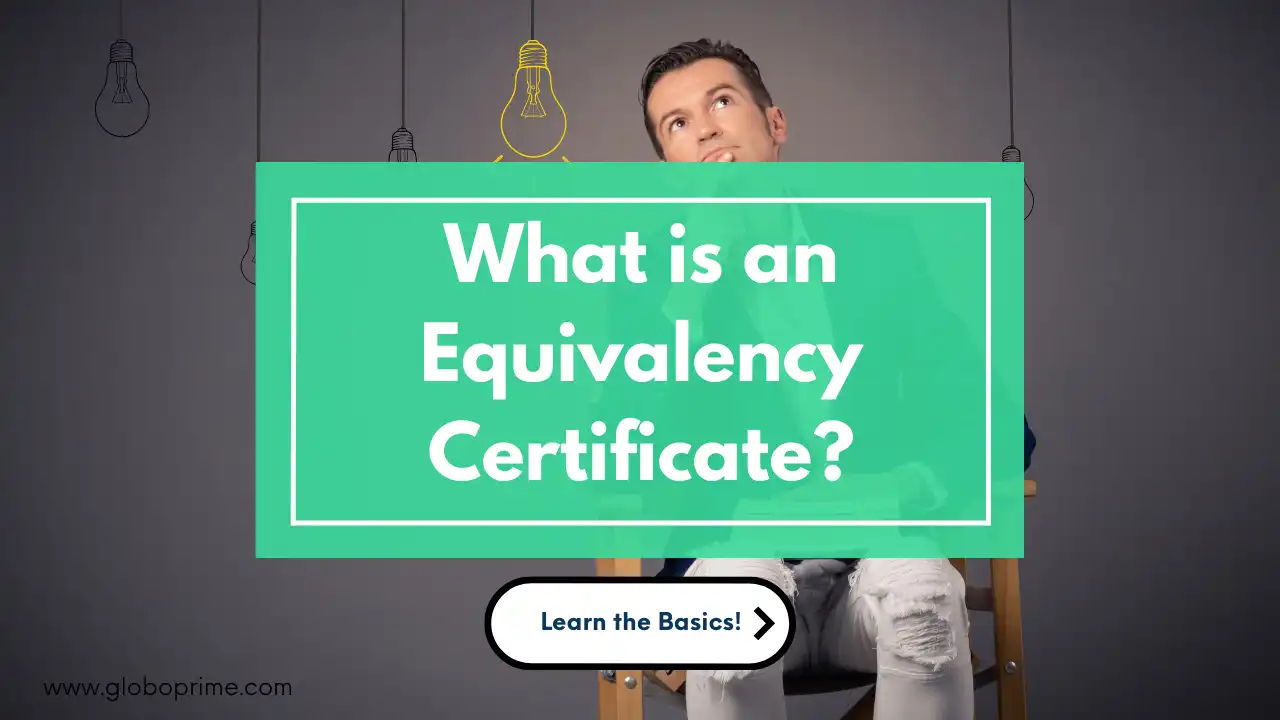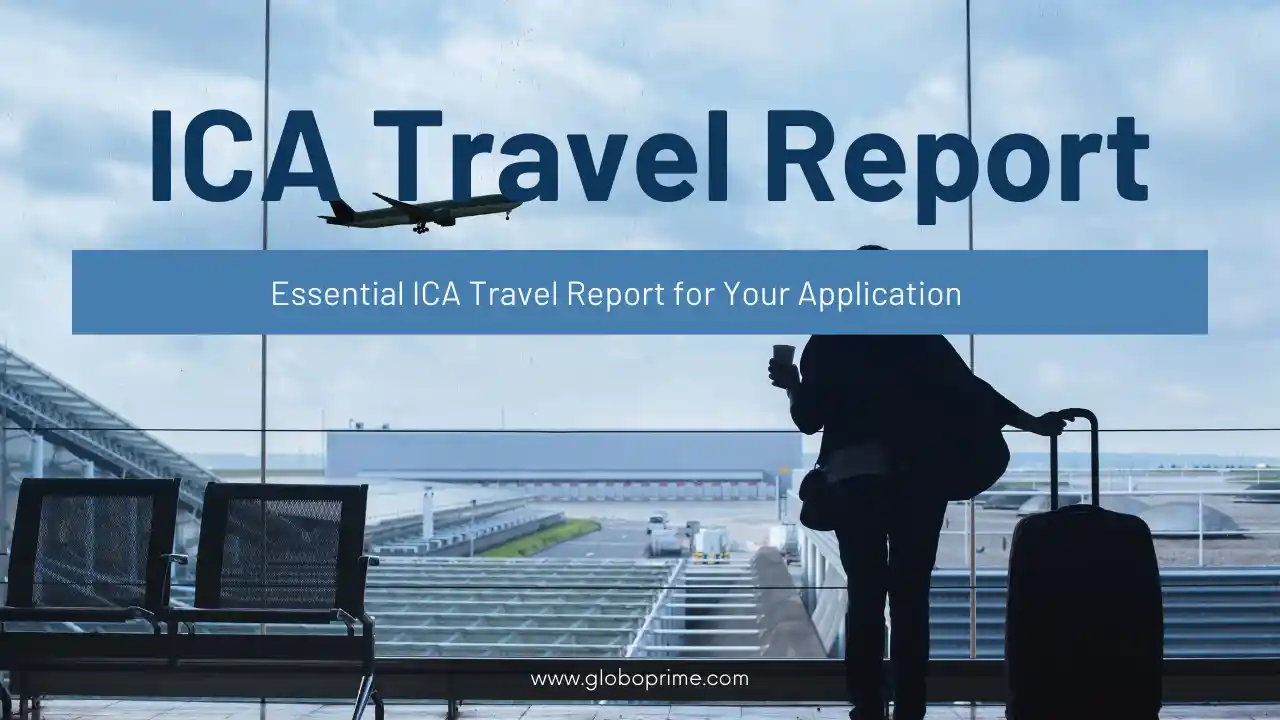
What is an Equivalency Certificate?
An Equivalency Certificate is an official document granted by the Ministry of Education in the UAE. Starting your career or pursuing higher education in the UAE with a foreign degree requires an equivalency certificate. This official document confirms your degree’s level and equivalence to a UAE-recognized qualification. This guide simplifies the process, outlining the steps and requirements for obtaining your equivalency certificate from the UAE Ministry of Education.

Steps to Get an Equivalency Certificate in the UAE:
Document Attestation:
Get your original degree and transcript attested by the UAE embassy or consulate in the country it was issued. This verifies the document’s authenticity.
Genuinity Letter / Embassy Letter:
For certain countries, obtain a Genuinity letter from the UAE embassy attestation confirming your university accreditation.
Data Flow and Quadrabay:
All verification even if done through IVS Global (for Indian certificates) or your embassy has issued the genuinity certificate for professions and emirates still require additional verification through platforms like DataFlow and QuadraBay
ICA Travel Report:
Prior to Apply for UAE MoE Equivalency Certificate you have to Apply for an ICA or GDRFA (Dubai) travel report detailing your entry and exit dates in the UAE.
Submit Documents:
Electronically submit your application and attested documents through the Ministry of Education’s equivalency portal.
Payment and Processing:
Pay the application fee and wait for the Ministry’s evaluation. You may be required to submit additional documents during this stage
Certificate Collection:
Once approved, your certificate of equivalency will be issued online as a digital soft copy from the Ministry of education.
Who needs an equivalency certificate?
Upon securing a position in the UAE in Government Projects in UAE, or Expats in government offices is likely that your employer will request you to provide an Equivalency Certificate Attestation.
Equivalency certificate be required for people who holds an academic qualification such as a secondary school certificate, bachelor’s degree, masters, or doctorate degree
Those who are required to apply for an equivalency certificate are:
Students
Students in UAE Or International Students wishing to Pursue higher studies in Schools or College which are affiliated with MOE and located in UAE would require to get equivalency certificate of your previous educational certificates.
Teachers, professors & faculty members
Teachers, professors are required to get equivalency in order to Teach in UAE Colleges, Or Universities in UAE. For teachers, you will require to secure a TLS (Teachers licensing through the portal of https://tls.moe.gov.ae/home#!/user/login/
Doctors & medical staff
Doctors, Medical staff must meet the Ministry of Health and Prevention (MOHAP), Department of Health (DOH) or Dubai Health Authority (DHA) requirements for medical license, which includes an equivalency certificate for your medical degree/ Educational Certificates if required. Most times for medical staff seeking to practice in the UAE just require the verification through Data Flow or Quadrabay sources.
Engineers
The Society of Engineering (SOE) in UAE requires all engineers like civil engineers, mechanical engineers, electrical engineers, structural engineers to have their engineering degree equivalency certificate to register and practice as engineers in the UAE This is the requirement by the UAE & Dubai authorities.
UAE Introduces New University Certificates Recognition System
In Recent update 2024, The UAE Ministry of Education (MoE) recently revamped its university qualification recognition process, which is crucial for expatriates and residents aiming to work, study, or obtain legal status like the Golden Visa in the UAE. The new system, called “University Certificates Recognition,” replaces the previous “University Qualification Equivalency” system, offering more flexibility and efficiency in recognizing degrees from foreign higher education institutions (HEIs).
Key Features of the New System:
- Simplified Recognition Process: The new system has streamlined the procedures, eliminating many of the previous requirements, such as attesting prior degrees and physical presence in the country of study. Now, degrees can be recognized even if obtained through distance learning, except for specialized professions like engineering, medicine, and law.
- Institution Ranking Matters: Recognition criteria are now primarily based on the global ranking of the HEI that issued the degree. For instance, degrees from universities ranked within the top 200 globally require only verification of the certificate’s validity, with no additional conditions. Lower-ranked institutions might face stricter criteria.
- Importance for Expats: An equivalency certificate from the MoE is vital for expatriates to validate their foreign qualifications in the UAE. This is mandatory for various professions, especially in fields like healthcare, education, and engineering, as well as for pursuing further studies and securing the UAE Golden Visa.
The certificate is necessary for anyone planning to work or study in the UAE with foreign qualifications, including students, teachers, doctors, engineers, and other professionals. For instance, doctors need this certification for licensing, and engineers require it for registration with the Society of Engineers in the UAE. By simplifying the foreign degree equivalency process the UAE aims to attract top talent and boost its economy.
How to Get Equivalency Certificate in UAE?
Individuals applying for the UAE golden visa
For Salaried Individuals above 30 thousand with Manager category visa, and hold an attested bachelor, Master’s or PhD degree from an accredited university, you may not need an equivalency certificate specifically for your Golden Visa application in Dubai.
Pre-requisites for Other Emirates
Abu Dhabi:
For professionals, an equivalency certificate from the Department of Knowledge and Education (ADEK) is usually required.
Additional documents like employment contracts, salary certificates, and professional licenses might be needed depending on your chosen category.
Sharjah:
The Sharjah Directorate of Education and Science (SED) issues equivalency certificates.
Specific requirements vary based on your profession and visa category.
How Can I Get A UAE Equivalency Certificate?
Upon receipt of the applicant’s information, the Ministry of Education undertakes a verification process. Upon confirmation of the provided information, the Ministry proceeds to issue the equivalency certificate. the Ministry will issue the equivalency certificate. You can then present the certificate to an employer in the UAE to prove that you have the required qualifications to work in that field.
Step 1: Degree Attestation
To obtain your equivalency certificate, it is essential to have your Master’s or Bachelor’s degree (your highest Educational Degree) Attested by the UAE embassy in the country where you received your degree. It’s important to note that if your degree is not in English or Arabic, Legal translation will be required when applying for the equivalency certificate.
Once attested, you’ll need to submit the following supporting documents based on your academic level:
If applying with a Bachelor’s degree:
Attested Bachelor’s degree
Transcript
High school/Secondary school certificate
If applying with a Master’s degree:
Attested Master’s degree
Transcript
Bachelor’s degree
Step 2: Applying for a Genuinity letter / Verification of Academic Degree Authenticity
The letter of authenticity should be provided officially by the issuing academic institute through the embassy of the country of study or the cultural attache and this Genuinity letter to confirm your study at your college or university was taken place at an accredited institute.
Although required from a small selection of countries, it is not required from all countries.
For example if you graduated in India and are currently processing your verification for MOE equivalency, note that a genuinity letter secured from IVS Global is good, but this verification still requires a further verification from Quadrabay or Data flow, so it’s recommendable to commence your verification either through Quadrabay or Dataflow directly. It will save time and money.
3-Data Flow and Quadrabay verification
How to Know if You Need DataFlow or Quadrabay Verification:
DataFlow:
Abu Dhabi:
The Department of Education and Knowledge (ADEK) often utilizes DataFlow for professionals applying for equivalency, medical degree verification etc. This platform streamlines authentication and equivalency assessment processes, verifying document authenticity and facilitating communication between UAE authorities and your educational institution.
Dubai:
DataFlow is typically used for equivalency applications in Dubai, it might be required for specific professions or government-related roles. It’s best to check with the relevant authority or employer to confirm if Dataflow Verification is necessary in your case.For sure Dataflow is required for your certificate equivalency from MOE.
QuadraBay:
Abu Dhabi:
Engineers seeking registration in Abu Dhabi might need to register with QuadraBay, a dedicated platform for engineering professionals. It verifies engineering qualifications and ensures compliance with professional licensure requirements set by the Society of Engineers (SOE).
Dubai:
QuadraBay is generally used for engineering registration in Dubai for the equivalency process that is part of the SOE application in UAE. However, engineers working on specific projects or seeking employment with certain entities might be asked to provide verification through QuadraBay.
It’s essential to verify with your potential employer or project manager if QuadraBay registration is required. Contact the relevant MOE. They will inform you if additional verification is necessary for your equivalency.
Applying for an ICA travel report in UAE

As part of the equivalency process, you must also provide an ICA travel report. This report, issued by an immigration authority, contains information including Exit dates, Entry dates, Location details (ports of entry/exit), applicant’s passport number, and immigration related details The ICA travel report will be issued by either the Federal Authority for Identity and Citizenship (ICA) or the General Directorate of Residency and Foreigners Affairs (GDRFA).
How do I apply for an ICA travel report?
There are two ways to apply for an ICA travel report in the UAE:
1. Online:
Visit the official UAE Immigration and Borders website
Create an account or log in if you already have one.
Click on “Services” and then “Passport & Visa Services.”
Select “Entry/Exit Movement Report” (Single or Detailed).
Enter your passport details and other required information.
Pay the service fee
Download and print your travel report after successful processing.
In person:
You can also visit any approved service center or Immigration & Borders customer service center. Here’s what you need to do:
Take your passport and a copy of your visa page.
Fill out the application form for the desired travel report
Pay the service fee
Receive your travel report on the spot.
Step 5: Apply for the equivalency certificate through the Ministry of Education portal
How do I get an equivalency certificate online?
Having gathered all the necessary documents, you can proceed to apply for the equivalency certificate via the Ministry of Education (MOE) website provided below:
What documents are required for UAE equivalency certificate ?:
Required documents to apply for certificate equivalency ? What you need to know for your UAE MoE equivalency application here are required documents :
Required Documents for UAE equivalency certificate
Diploma & Bachelor’s Degrees
- University degree/Graduation Certificate
- Transcript/Mark sheets
- Proof of Attendance in the country of study (documentation required)
- Entry and exit report from the Federal Authority for Identity and Citizenship (ICA)
Post Graduation Degrees
- University degree/Graduation Certificate
- Transcript/Mark sheets
- Bachelor’s degree and Transcript/Mark sheets
- Proof of Attendance in the country of study (documentation required)
- Entry and exit report from the Federal Authority for Identity and Citizenship (ICA)
Bachelor’s and Diploma Degrees
- University degree/Graduation Certificate
- Transcript/Mark sheet
Post Graduation Degrees
- University degree/Graduation Certificate
- Transcript/Mark sheet
How To Apply for Primary Source Verification (Ministry of Education UAE)
- Log in to the dataflow page through their website
- Sign in with UAE Pass
- Select Start a new application
- Enter your educational details
Documents required for obtaining a high school equivalency certificate based on the curriculum include:
Curriculum MOE requirements
American Curriculum:
Graduation diploma copy
Transcripts/marks sheets for grades 10, 11 & 12
Pass 5 approved subjects (Arabic and Islamic Studies excluded)
Emirati students: EMSAT English (min. score: 1100), EMSAT Math (min. score: 500)
Resident students: EMSAT English (min. score: 1100) OR Academic IELTS (min. score: 5.0) OR TOEFL IBT (min. score: 61), EMSAT Math (min. score: 500) OR SAT1 Math (min. score: 450)
British Curriculum:
Complete Year 12/13
Pass 5 approved ordinary Level, GCSE, or IGCSE subjects
Pass two approved Advanced Subsidiary Level subjects or one Advanced Level subject
International Baccalaureate (IB) Diploma:
Successfully complete grade 12
Pass IB Diploma or IB Certificate tracks with specified conditions
Canadian Curriculum:
Graduation diploma issued by accrediting province
Pass grades 10, 11 & 12
Australian Curriculum:
Graduation diploma issued by accrediting province
Pass grades 10, 11 & 12
French Baccalaureate:
Successfully pass grades 10, 11 & 12
Russian Curriculum:
Recognized high school certificate (11-year program)
Attested graduation certificate and academic transcript for the last 3 years or grade 9 certificate + last 2 years’ certificate
Indian and Pakistani Curriculum:
Graduation certificates for grades 10 & 12
Academic transcript attested by the educational board or council
For three-year diploma: Diploma certificate + transcript attested
Iranian Curriculum (12 years of study):
Graduation certificate copy
Transcripts for grades 10, 11 & 12
6-Payment and Processing
Completing Your Application:
Submit Your Payment:
The application fee is different for different certificate equivalencies. Once you complete your MOE equivalency application, you need to pay online. This fee initiates the evaluation process.
The Ministry may request additional documents to verify your credentials. They’ll contact you directly if needed, so ensure your contact information is up-to-date.
Regularly check your email for updates or requests from the Ministry. Promptly responding to any inquiries ensures a smooth evaluation process.
Track the progress of your application online through the Ministry’s E-Services portal. This provides real-time updates and estimated completion dates.
Stage 2: Certificate Collection
7- Receiving Your Equivalency Certificate:
Once your application is approved, you’ll receive an email or SMS notification with instructions that your equivalency certificate is ready to download.
You can download the UAE equivalency certificate; it is always a soft copy.
How long does it take to get an equivalency certificate from the UAE?
The application process takes Approximately from 1 to 4 months for attestation and equivalency depending on university verification during the process.
Get started with GloboPrime Attestation Services
We can assist with getting your UK, US, France documents attested in order to apply for your equivalency certificate Globoprime
If you wish to Attest your documents, we can assist with getting your equivalency certificate in the UAE.
Disclaimer:
Please note that the above information regarding UAE visa regulations and equivalency processes is to the best of our knowledge which is subject to change without prior notice. We recommend confirming the latest requirements with the relevant government authorities (e.g., Ministry of Education) before applying.
